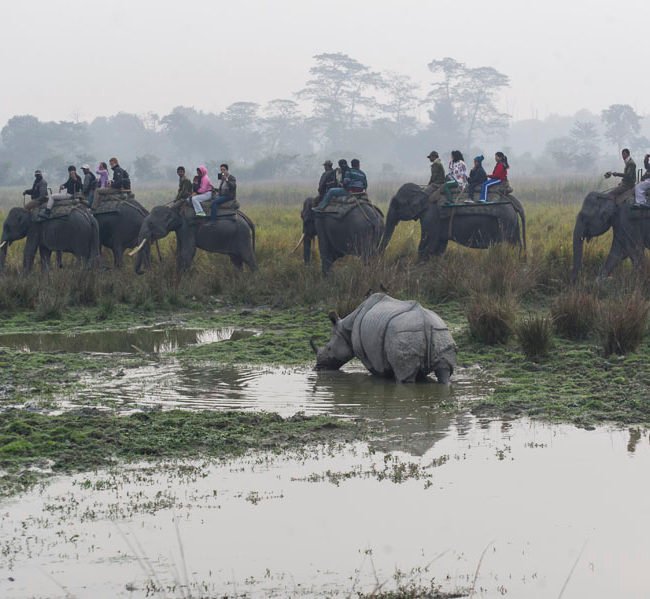Tour Plan
DAY 01: DIBRUGARH ARRIVAL
Arrive Dibrugarh Airport ……..your gateway to the beautiful North East!!!! Our local office representative shall meet & greet you @ airport & you shall be transferred to hotel. On arrival check into the hotel later proceed to visit Koli Aai Thaan Koi Aai Thaan is a very famous tourist spot of Dibrugarh, which is dedicated to Koli Aai, the daughter of the head priest of the Dibaru Satra of Assam, Sarumechlow and Bormechow Maidam These two maidams are found in the Lengeri mouza locality of Dibrugarh city and are said to be the graveyards of Sarumechlow and Bormechow, who were the queens of King Sukhampha Khura (1552 – 1611) of the Ahom regime.
Morning after breakfast proceed to visit Barbarua Maidam At a distance of 14 km to the south of Dibrugarh, just adjacent to the NH37, there are two ancient graveyards that were raised to honor two officials of the Ahom Dynasty. Historian Sarbananda Rajkumar believes that these two maidams or graveyards were erected for Bura Dihinigia Barbarua and Deka Dihingia Barbarua. Apart from these, there are several other smaller maidams at the same site, which were constructed to honor other soldiers of the same regime. Dehing Satra The ruins that are seen on the banks of the Dehing River under Larua mouza in present Dibrugarh, was a very famous satra during the rule of the Ahom king Rajeswar Singha. During the famous Moamoria revolution, the satra received royal support from Rajeswar Singha and also from a number of other kings like Lakhi Singha and Gaurinath Singha.
DAY 03: TAI PHAKI VILLAGE AND NAMPHAKE VILLAGE VISIT
visit Tai Phakial Village.
Thai Phakial – (The Tai words 'Pha' meaning wall and 'Ke' meaning ancient or old.) The Phake is also known as the Phakial, they had migrated from Thailand to Assam in 18th century, they speak Thai language. Even during the modern time they still follow their traditional culture. They have a fine tradition to keep their family record, the name of the record is Ho Likboi, generally the elder of the family known as the Pathek is well versed prepare the record. They practice Buddhism, there is a Buddhist monetary in Namphake village established in 1850 the monks in the monasteries is known as CHOW MOUN . They also have the sound knowledge in Pali language. The residence claim to be 100% literate. One interesting fact is that the villager claims the police had never entered the premises as because the Monks settled the disputes among the villagers, they also rely on Herbal cure. They marry within their community only but there is no restriction if someone wants to marry from outside. They are basically patriarchal society the son inherits the fathers property. Though few in number and in spite of an identity crisis, the Tai Phakes have been able to maintain their glorious legacy. Back to hotel and overnight stay at Dibrugarh.
DAY 04 : DRIVE DIBRIGARH TO JORHAT
Post breakfast , proceed to Jorhat.
DAY 05:JORHAT - HOOLONGAPAR GIBBON SANCTUARY - JORHAT
Post Breakfast visitHoolongaparGibbon parkNamed after the only Ape (Hoolock Gibbon) found in India, Gibbon Wildlife Sanctuary is a small Sanctuary of 20.98 sq. kms. inJorhat district of Assam.
Later Visit Jorhat City’s historical places like ChandrakantaHandiquebhavan, Namghar, Tea Garden & Tea Reseachcenter later come back to hotel
Overnight stay at Jorhat.
Highlight: - Jeep Safari at Hoolock Gibbon Wildlife Sanctuaryand Tea Research Center
DAY 06 : JORHAT TO MAJULI ISLAND
Morning after breakfast depart for Majuli Island.
Majuli Island: The largest inhabitant river line island in the world Majuli has been the hub of Assamese neo-vaishnavite culture and it is the cultural capital and the cradle of Assamese civilization for the past 500 years, by the revered Assamese saint SrimantaSankardeva and his disciple Madhavdeva. The first vaishnavite monastery was at Belaguri in west Majuli. After that 65 Monasteries (SATRAS) were set up. Today only 22 of the original 65 are survived.
The main tribe of Majuli is Mishing. They comprise of about 47% of the population of Majuli. The term Mishing is also made up of two words- 'mi' means people and 'yassing' means fine, and that's why they call themselves fine people. Other comprises Chutias, Deoris, SonowalKacharies, Koches, Naths, Kaivarttas, Mattaks, Ahoms, Kalitas, Brahmins etc.
Arrive and check in at traditionally built bamboo hut.
Later explore the traditional roots of Assamese society by visiting the vaishnavite monasteries of Majuli.
Overnight at MAJULI
Highlight: - VaishnaviteSatras (SATRAS are charged additionally & Need to be Pre-Booked)
DAY 07: MAJULI - MISHYING VILLAGE – MAJULI
Morning after breakfast, today we will explore the rest of the important sites of Majuli covering AuniatiSatra (Founded by NiranjanPathakdeva, the satra is famous for the "Paalnaam" (Monastery Prayer) and Apsara Dances (Dance of the Angels) and also its extensive assortment of ancient Assamese artefacts, utensils, jewellery and handicrafts) and NatunSamaguriSatra (ShamaguriSatra is a unique feature of Vaishnavism in Assam. Shamaguri is not only a hub of art, cultural and classical studies but is also famous for its unique art of mask making). Afternoon we will take you to Salmara Village to show the Art of Pottery Making (Pottery in Majuli is probably the single most important heritage of all. The potter’s wheel has not found its way till date. Pots are made with hand from beaten clay and burnt in driftwood fired kilns. Archeologists opine this to be a missing link between Mohenjo-Daro &Harappan civilization). The day would come to an end with a visit to Dhapak Village of the Mishying Tribes (Mishyings are a plains tribe who prefer to have their settlements next to the Brahmaputra River. They are of the Arunachal hill tribe origin especially of the Adi tribes of the Abor hills of Arunachal Pradesh. Later Back to the resort.Overnight Stay at Majuli.
Highlight: - MISHING Tribes (Cultural Dance is charged additionally & Need to be Pre-Booked)
DAY 08: MAJULI TO KAZIRANGA via DEOPARBAT
After an earlybreakfast , drive to KazirangaNationa Park via Deoparbat Ruins.
Deoparbat Ruins, also known as Deopahar Ruins is an archeological site situated at Numaligarh town in Golaghat district of Assam. It is one of the popular places of heritage in Assam and among the best places to visit in Kaziranga National Park.
The Deopahar Ruins are archeological remains of a Shiva Temple and Lakhowgart Fortress that belongs to 8th - 9th century CE. The ruins of Deopahar tell about the culture of Assamese ancestors and the Ahom people. According to the mythology, Deopahar is part of the Kingdom of Jarasandha, who related to the great epic Mahabharata. The statues of this temple are scattered on a hill top, from where visitors can get a view of the Numaligarh tea estate and nearby KarbiAnglong hills. Though in ruins, the grandeur and beauty of the place is something that you would remember forever. Climbing the Deopahar is quite tiring especially on a hot day.
Timings: 9 AM - 5 PM
Return to Kaziranga for the night.
Highlight: - Deoparbat Ruins
Early morning go for ELEPHANT RIDE @ 5AM. This is one of the most enjoyed safari to explore the wide varieties of wildlife in the Kaziranga National Park. This is one of the most enjoyed safari to explore the wide varieties of wildlife in the Kaziranga National Park. The vast area covered by the Elephant Grass can be best viewed when you are on an elephant's back. The elephant ride is best enjoyed in the early hours of dawn. The main attraction of it is one horned rhinoceros with wild buffalo, Elephant, tiger a variety of deer, Bear, Python, and prehistoric looking monitor lizard. The Kaziranga wildlife is also adorned with the crested serpent eagle, Pella's fishing eagle and Grey headed fishing Eagle with a number of other Bird species like the Jungle fowl, Bengal florican and water fowl, goose, a large number of pelicans, Black naked stork, Snake Bird and so on.
Evening free at leisure.Overnight stay at Kaziranga.
Highlight: - Elephant Safari
DAY 10: KAZIRANGA– GUWAHATI (APPROX 3 hrs drive)
Morning after breakfast drive to Guwahati. On arrival check into hotel, later visit KAMAKHYA TEMPLE – Kamrup Kamakhya has been the seat of the powerful tantrik cult in India. Situated atop the Nilachal Hill in Guwahati, this temple is one of the 108 Shakti Peethas of the country. Rising to a modest height of 562 feet above the mighty river Brahmaputra, the hill on which the temple stands commands a magnificent view of the entire city, NAVAGRAHA TEMPLE - dedicated to the nine planets in the solar system this temple was built by the ruler Rajeswar Singh in late 18th century AD. Also known as the Abodes of Surya, the Navagraha Temple or the temple of the nine celestial bodies is located in the south eastern part of Guwahati, on a hill by name Chitrachal. It is a center of astrological and astronomical research.
In the evening enjoy the RIVER CRUISE over the river Brahmaputra (Optional cost). The longest river in India, the Brahmaputra, runs through the spectacular scenery of Assam and is an ideal introduction to river cruising in India. Overnight in Guwahati.
Highlight: - Brahmaputra River cruise (NOT INCLUDED)
DAY 11: GUWAHATI DAY AT LEISURE
You can explore around, go for shopping or just relax
DAY 12: GUWAHATI AIRPORT DROP
After breakfast transfer to Guwahati airport to depart for onward destination.


















